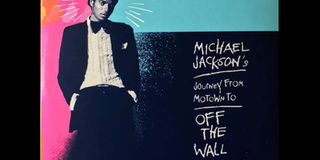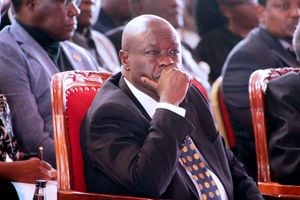New documentary brings Michael Jackson back to life

Cover of the new documentary on the life of Michael Jackson titled Michael Jacksonâs Journey from Motown to Off the Wall (2016) made by the acclaimed filmmaker, Spike Lee. PHOTO| JOYCE NYAIRO
What you need to know:
The fundamental question that he tries to answer in this new documentary is this: How does a child prodigy like Michael transition from a cute nine-year-old star into an adult, and make something more or better out of that?
How do you make that 180-degree turn from what you were so well-known for and establish a new reputation?
If Michael Jackson is part of the soundtrack of your life and if you grew up in that era before live-streaming, YouTube and video on demand, there is a new treat in store for you. It is a documentary titled, Michael Jackson’s Journey from Motown to Off the Wall (2016), made by the acclaimed filmmaker, Spike Lee.
Actually, even if you belong to the generation that worships Beyoncé, Bruno Mars, Jason Derulo, P-Square, Usher and Chris Brown, and you have never quite figured out the roots of their performance mode, or how male singers master a falsetto with such compelling vocal power, you will enjoy this documentary. It proves that every great artiste is influenced by another great artiste.
Spike Lee directed some of Michael’s music videos and this is his second documentary on the legacy of MJ. The first one was Bad 25 (2012), a celebration of the 25th anniversary of that 1987 album that produced five No. 1 hit singles.
Lee has made several outstanding films, but he probably achieved his biggest ripples with When the Leeves Broke (2006). Provocatively sub-titled, “a requiem in four parts”, this documentary interrogated the US Government’s role in and response to Hurricane Katrina. Clearly, Lee is never afraid to tackle controversial subjects or to reinterpret well-worn stories.
FUNDAMENTAL QUESTION
The fundamental question that he tries to answer in this new documentary is this: How does a child prodigy like Michael transition from a cute nine-year-old star into an adult, and make something more or better out of that? How do you make that 180-degree turn from what you were so well-known for and establish a new reputation?
These questions are not limited to pop stars and socialites. They are intricate existential issues for anyone who has ever wondered how to cultivate a new persona beyond the basic act of swearing a deed poll to change one’s name.
In 1975, Michael and three of his brothers decided to leave Motown, the record company established by Berry Gordy, who signed The Jackson 5 in March 1969, and released their first hit, "I Want You Back". Although the Jackson 5 went on to have a string of hit records with Motown, the teenage Michael was restless.
He wanted to write and produce his own songs but the Motown contract limited the group to material written and produced by the corporation.
When they signed up with the CBS label, Epic Records, Michael, Jackie, Tito and Marlon discovered that they couldn’t use the name Jackson 5. Legally, it belonged to Motown. So they rebranded themselves as The Jacksons and brought on board their younger brother, Randy.
EXAMINES CHALLENGES
Spike Lee examines the challenges that came with this shift. First, Michael’s older brother, Jermaine, had married Gordy’s daughter Hazel. So he chose to remain at Motown. Next, the credibility of the group was in question. They were so type-cast that they even had a cartoon series as part of the strategy to market their “wholesome” sound to a family audience. How were they to fit into disco, the new craze in town?
For Spike Lee, Off the Wall marks the moment when Michael became an adult and yet, Michael was just 20 when that album was released. The documentary traces his transformation by identifying the factors that shaped the making of Off the Wall.
Lee interviews some of the musicians who played instruments on the 10 songs on that album. He tracks Michael’s movements in the three years leading up to the release and shares unseen footage and rarely publicised material from Michael’s archives.
One of these gems is a hand-written letter from Michael to his brothers while they were on the 1979 Destiny tour. “…I want a whole new character, a whole new look, people should never think of me as the kid who sang ABC.
I should be a new incredible actor, singer, dancer that will shock the world … I will do no interviews, I will be magic, I will be a perfectionist, a researcher, a trainer, a master”. And he really did become all of those things.
But he did not do so by chance. He did it through careful planning and deliberate learning. He studied Leon Huff and Kenny Gamble, the Philadelphia “proprietors of the disco sound”. He recorded at home at all hours and wrote the hit single "Shake your Body (down to the ground)" with Randy.
He found an acting part in the Berry Gordy produced film The Wiz, and he aced it. He frequented the famous Studio 54 disco in New York and spent long hours in the DJ’s booth studying people’s dance moves, absorbing the disco atmosphere.
Lastly, inspired by the musical success of The Wiz, Michael sought out legendary music composer Quincy Jones and persuaded him produce a pop album. Until then, Quincy had been associated with Jazz and film scores.
Some 36 years since its release, Off the Wall is a DJ’s dream album. It has at least five songs that are guaranteed to pull any crowd to the dance-floor. Perhaps its most iconic sound is Michael’s high-pitched scream, “woooo”, on "Don’t Stop Till You Get Enough". But even without this scream, the opening baseline is totally energising — the kind of sound that promises you that you will have a great day….or night!
Live performances of these songs show long instrumental stretches that allow the other musicians to shine. Some songs carry that soulful MJ feel that he mastered as a nine-year old, never mind that sometimes he was crooning over a dead rat, as in Ben (1972).
Apparently, Michael cried every time he performed "She’s out of my Life". That song confirms that Michael could really do heartbreak — he caused it, performed it, lived it, defined it, amplified it and then, he soothed it.
Lee’s documentary unpacks the back story behind these songs and the musical collaborations of the time.
Lee also features a cast of today’s greats, explaining how Michael’s music has shaped their respective work — Pharell Williams, The Weeknd, L.A. Reid, Mark Ronson, John Legend, Rosie Perez, Misty Copeland the ballerina, even Kobe Bryant, the hoop star.
Off the Wall reached American music shelves in the second week of August 1979. But this was the era of “snail mail”. Even with the best efforts of Voice of Kenya DJs like Abdul Haq, that album didn’t really get to Kenya until December 1979. And then, suddenly, it was everywhere! It became emblematic of a season that some of us would later describe as “the summer of our lives”. School was out, national examinations were over and despite the slightly inaudible lyrics, Michael seemed to say everything that we were feeling.
Truly, Michael Jackson’s enunciation was never very clear and his grammar was sometimes dodgy, but hey, such are the liberties that we call art! He was quoting
weird lyrics from the science fiction film, Star Wars – “keep on with the force don’t stop” — but on Kenyan dance floors the kids were shouting, “keep on with the post office”. Or was that “keep on with the forks don’t stop”? As ardent Lingala fans, we Kenyans have long lived by the rule that it doesn’t matter what the song is saying, the only thing that counts is how it makes you feel.
Spike Lee has achieved what all good documentaries do. He takes you way back and fills you with nostalgia for a time, a sound, a feeling. And then he tells you a whole lot of things that you did not know and creates a context for a culture, a political moment and those who made it happen.
GIFT OF MELODY
Michael was clearly born with the gift of melody, but if he rose to become one of the greatest entertainers of all time, it was because he paid such close attention to the craft. In a June 1976 interview he said, “one of the most important things in being successful is listening, listening and watching.” He knew precisely how he wanted every instrument in a song to sound and he played it with the musician until he was satisfied.
At Michael’s funeral service in July 2009, Berry Gordy declared, “Michael raised the bar, and then he broke the bar!” But it was the Reverend Al Sharpton, who enthralled the house with his summary of Michael’s essence. “…he didn’t accept limitations … he put on one glove, pulled his pants up and broke down the colour curtain … Michael rose to the top; he out-sang his cynics; he out-danced his doubters; he out-performed the pessimists. Every time he got knocked down, he got back up, every time you counted him out, he came back in, Michael never stopped!”
Indeed. As the saying goes, artistes never die. Michael Jackson has never left the stage.





